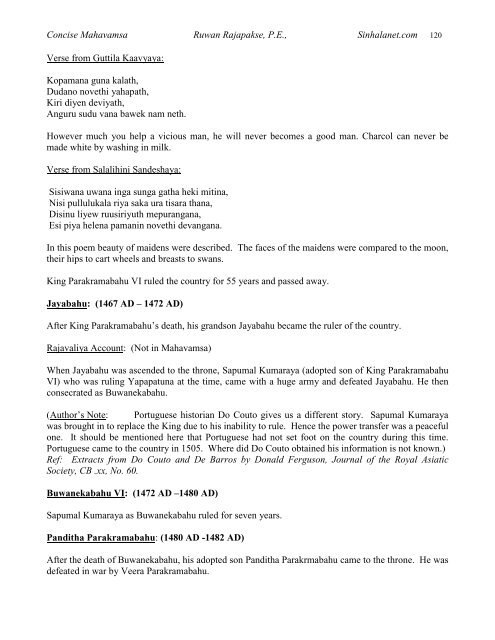Concise Mahavamsa Ruwan Rajapakse, P.E., Sinhalanet.com 1
Concise Mahavamsa Ruwan Rajapakse, P.E., Sinhalanet.com 1
Concise Mahavamsa Ruwan Rajapakse, P.E., Sinhalanet.com 1
Create successful ePaper yourself
Turn your PDF publications into a flip-book with our unique Google optimized e-Paper software.
<strong>Concise</strong> <strong>Mahavamsa</strong> <strong>Ruwan</strong> <strong>Rajapakse</strong>, P.E., <strong>Sinhalanet</strong>.<strong>com</strong> 120<br />
Verse from Guttila Kaavyaya:<br />
Kopamana guna kalath,<br />
Dudano novethi yahapath,<br />
Kiri diyen deviyath,<br />
Anguru sudu vana bawek nam neth.<br />
However much you help a vicious man, he will never be<strong>com</strong>es a good man. Charcol can never be<br />
made white by washing in milk.<br />
Verse from Salalihini Sandeshaya:<br />
Sisiwana uwana inga sunga gatha heki mitina,<br />
Nisi pullulukala riya saka ura tisara thana,<br />
Disinu liyew ruusiriyuth mepurangana,<br />
Esi piya helena pamanin novethi devangana.<br />
In this poem beauty of maidens were described. The faces of the maidens were <strong>com</strong>pared to the moon,<br />
their hips to cart wheels and breasts to swans.<br />
King Parakramabahu VI ruled the country for 55 years and passed away.<br />
Jayabahu: (1467 AD – 1472 AD)<br />
After King Parakramabahu’s death, his grandson Jayabahu became the ruler of the country.<br />
Rajavaliya Account: (Not in <strong>Mahavamsa</strong>)<br />
When Jayabahu was ascended to the throne, Sapumal Kumaraya (adopted son of King Parakramabahu<br />
VI) who was ruling Yapapatuna at the time, came with a huge army and defeated Jayabahu. He then<br />
consecrated as Buwanekabahu.<br />
(Author’s Note: Portuguese historian Do Couto gives us a different story. Sapumal Kumaraya<br />
was brought in to replace the King due to his inability to rule. Hence the power transfer was a peaceful<br />
one. It should be mentioned here that Portuguese had not set foot on the country during this time.<br />
Portuguese came to the country in 1505. Where did Do Couto obtained his information is not known.)<br />
Ref: Extracts from Do Couto and De Barros by Donald Ferguson, Journal of the Royal Asiatic<br />
Society, CB .xx, No. 60.<br />
Buwanekabahu VI: (1472 AD –1480 AD)<br />
Sapumal Kumaraya as Buwanekabahu ruled for seven years.<br />
Panditha Parakramabahu: (1480 AD -1482 AD)<br />
After the death of Buwanekabahu, his adopted son Panditha Parakrmabahu came to the throne. He was<br />
defeated in war by Veera Parakramabahu.


